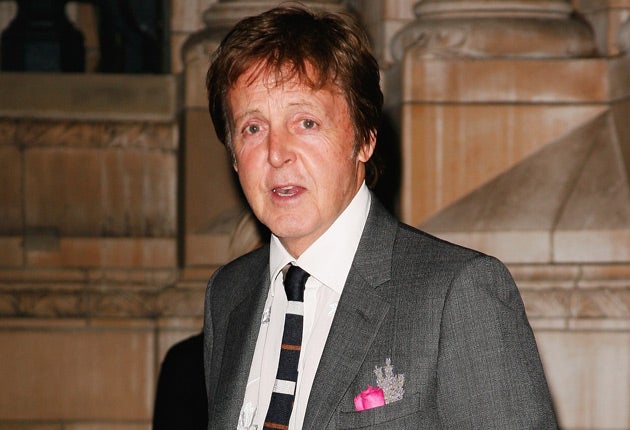McCartney prepares for landmark Israel concert

Your support helps us to tell the story
From reproductive rights to climate change to Big Tech, The Independent is on the ground when the story is developing. Whether it's investigating the financials of Elon Musk's pro-Trump PAC or producing our latest documentary, 'The A Word', which shines a light on the American women fighting for reproductive rights, we know how important it is to parse out the facts from the messaging.
At such a critical moment in US history, we need reporters on the ground. Your donation allows us to keep sending journalists to speak to both sides of the story.
The Independent is trusted by Americans across the entire political spectrum. And unlike many other quality news outlets, we choose not to lock Americans out of our reporting and analysis with paywalls. We believe quality journalism should be available to everyone, paid for by those who can afford it.
Your support makes all the difference.Sir Paul McCartney was today preparing for his controversial concert in Israel, more than 40 years after the Beatles were banned amid concerns over youngsters being corrupted.
The landmark Friendship First Concert will take place tomorrow in Tel Aviv in front of tens of thousands of fans, despite fears over extremist threats.
The Beatles were famously banned from performing in the country 43 years ago and it will be Sir Paul's first concert in Israel.
Radical cleric Omar Bakri Mohammed has urged Sir Paul to cancel the visit out "of respect of the feelings of Muslims in Palestine".
But the singer has not heeded calls to stop the show.
The 66-year-old has said on his website that he hoped his Tel Aviv concert would "reawaken" the idea of peace.
He said: "The world knows about the conflicts that have been in that region and I like to think that if I go to a place it becomes evident that my message is a peaceful one and I hope that the idea will spread.
"It often does happen you know - you'll go to a place and it can affect the audience.
"It reawakens the idea - so that is definitely my message and when I am talking to people, that will be my message and I am sure it is a message shared by a lot of the audience too."
He added: "People ask this question through the years. 'Do you think music can change things?'
"I think it can. I think it's good for people's souls. I think without music it would be a seriously bad world, we would have more problems.
"Music can help people to just calm them down. I also think it can be very interesting for change.
"I always cite a John (Lennon) song Give Peace A Chance. If you watch the footage from back then, about a million people outside the White House chanting that song to Nixon inside the White House, I think that had an effect.
Enjoy unlimited access to 100 million ad-free songs and podcasts with Amazon Music
Sign up now for a 4 month free trial (3 months for non-Prime members)
Enjoy unlimited access to 100 million ad-free songs and podcasts with Amazon Music
Sign up now for a 4 month free trial (3 months for non-Prime members)
"On that occasion, obviously for them to have that song to portray how they were feeling I think was very important. So yes, I think it can change things.
"Songs like We Shall Overcome have been very important for the civil rights movement so yeah, I think music is great and it can make changes."
Israel banned the world's most famous band from performing in Israel in 1965, fearing it might corrupt their youth.
Sir Paul said: "They said we were bad for the youth of Israel, and I think that was a mistake - I don't think we were that bad.
"But you know what ... we took it as fun, it didn't really worry us we just went off and played somewhere else.
"Our manager, Brian Epstein, who was Jewish, was, I think, more insulted than we were.
"He said: 'They won't let you play, they think you are bad for their youth' so we moved on to the next gig."
Join our commenting forum
Join thought-provoking conversations, follow other Independent readers and see their replies
Comments